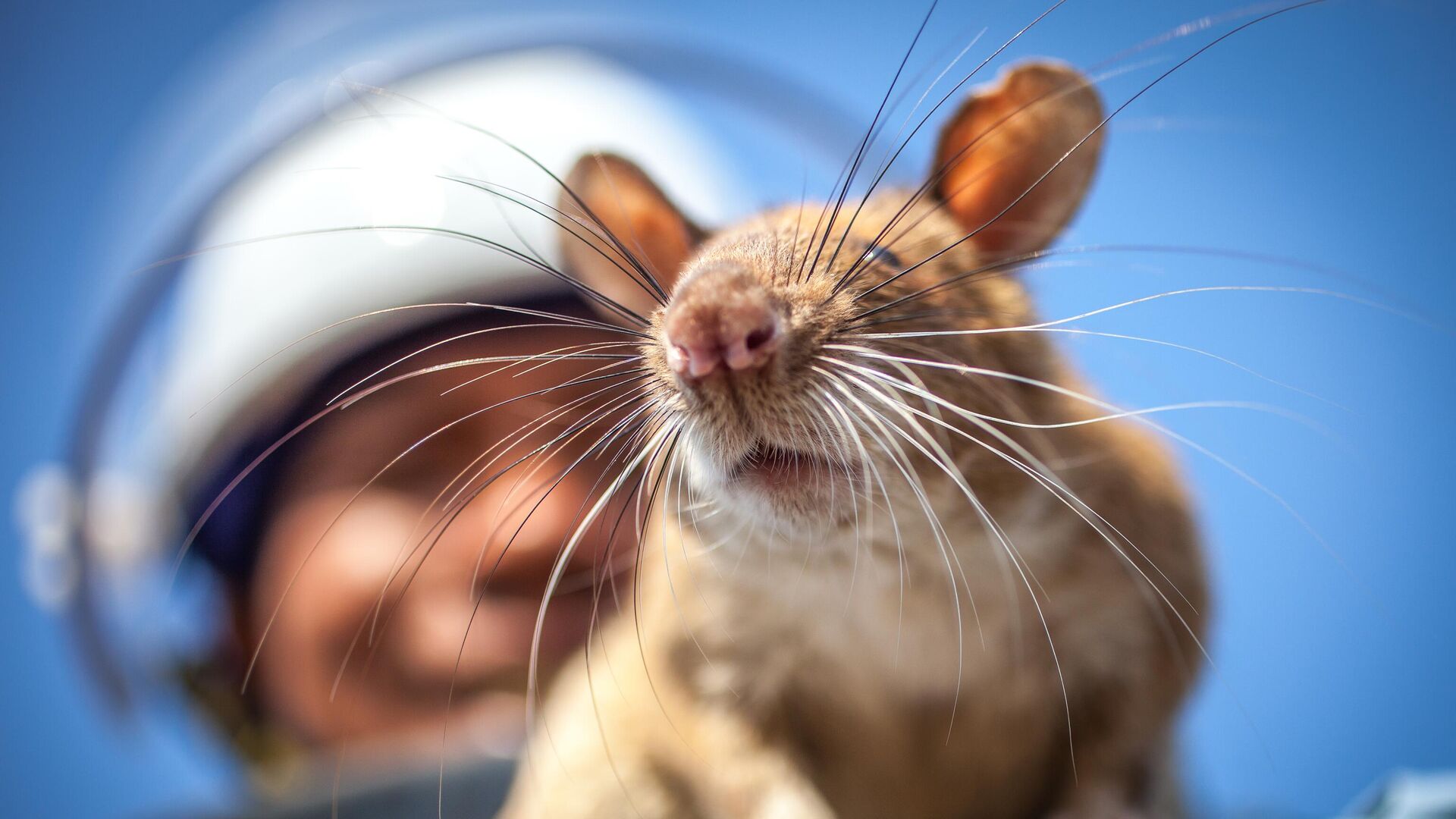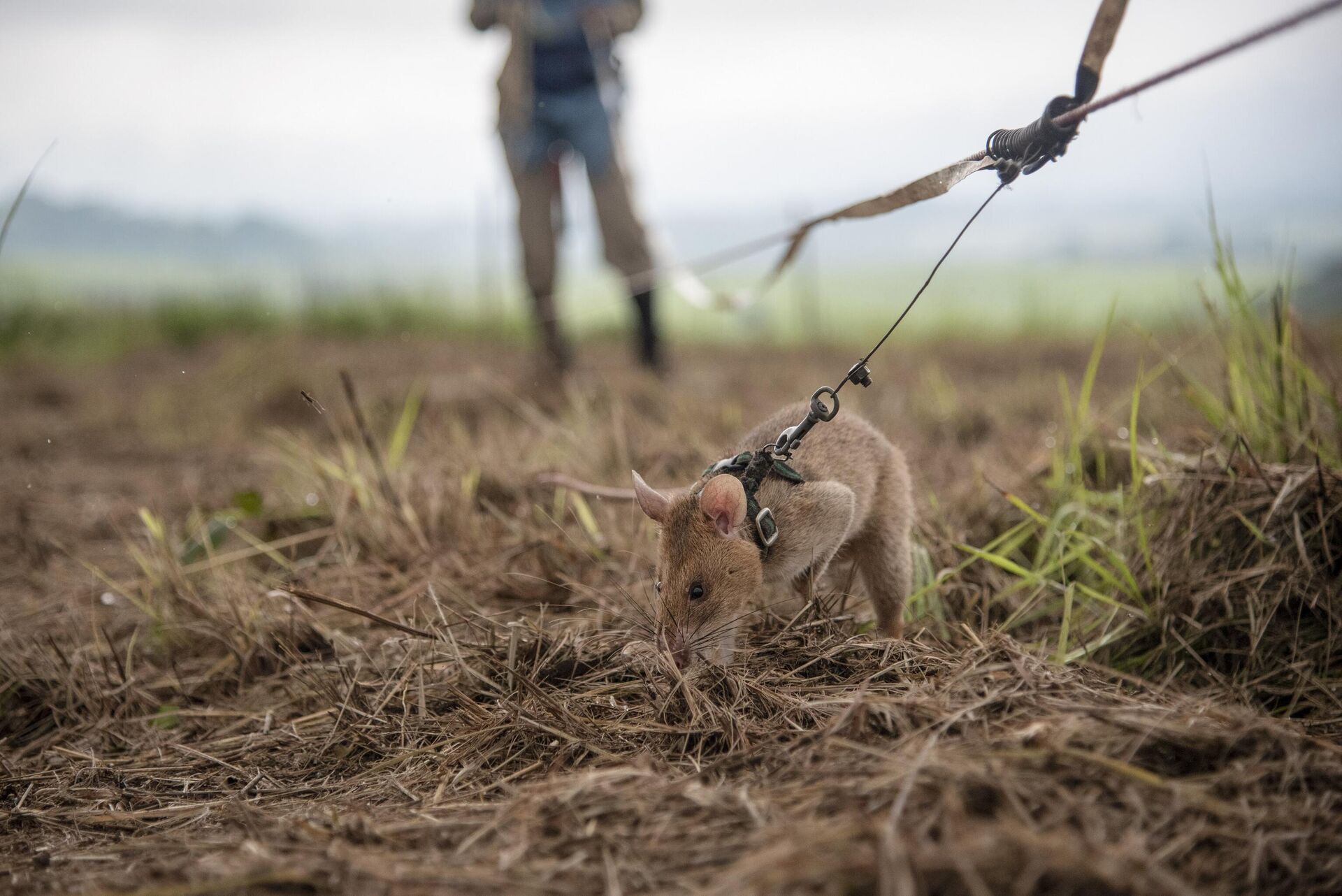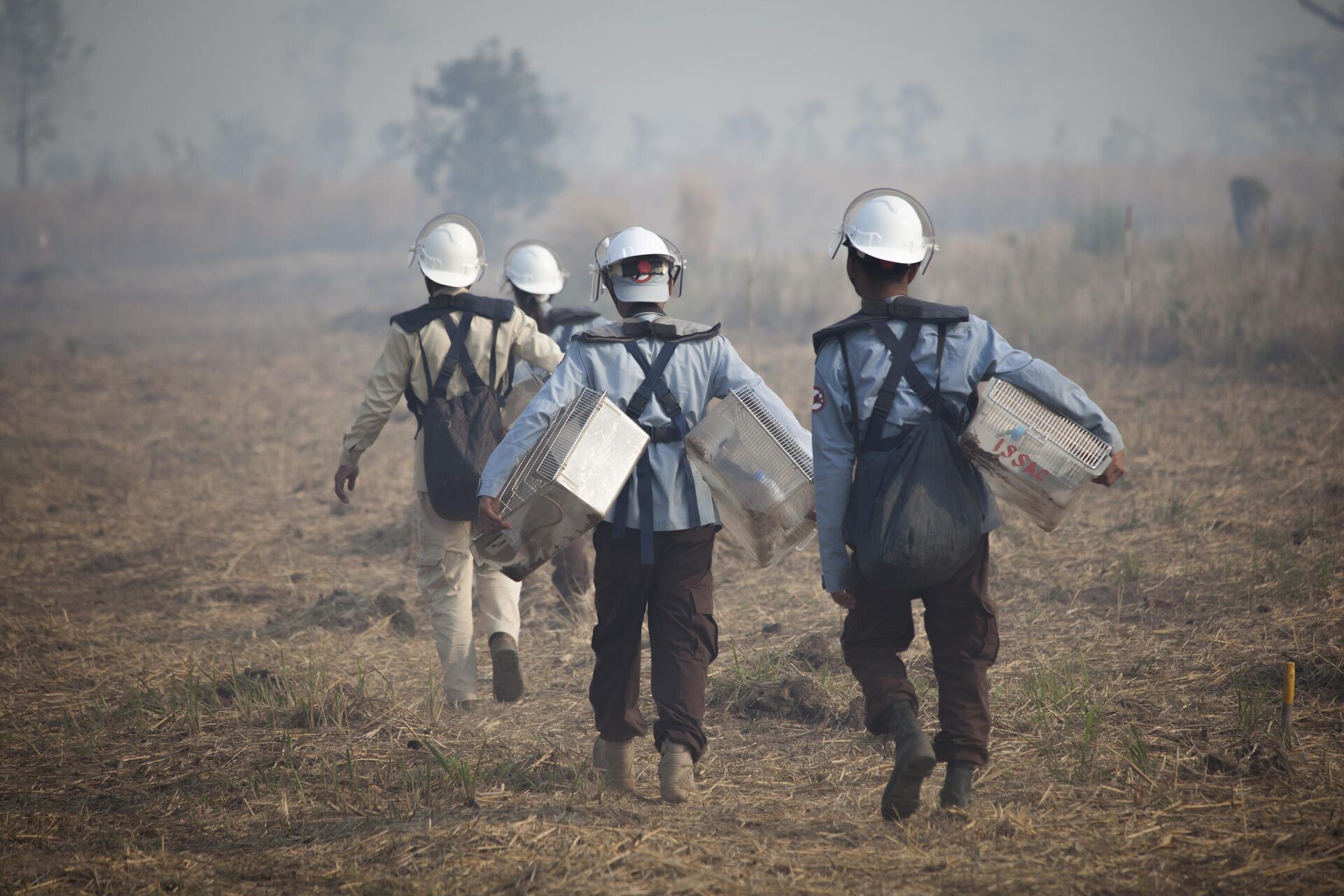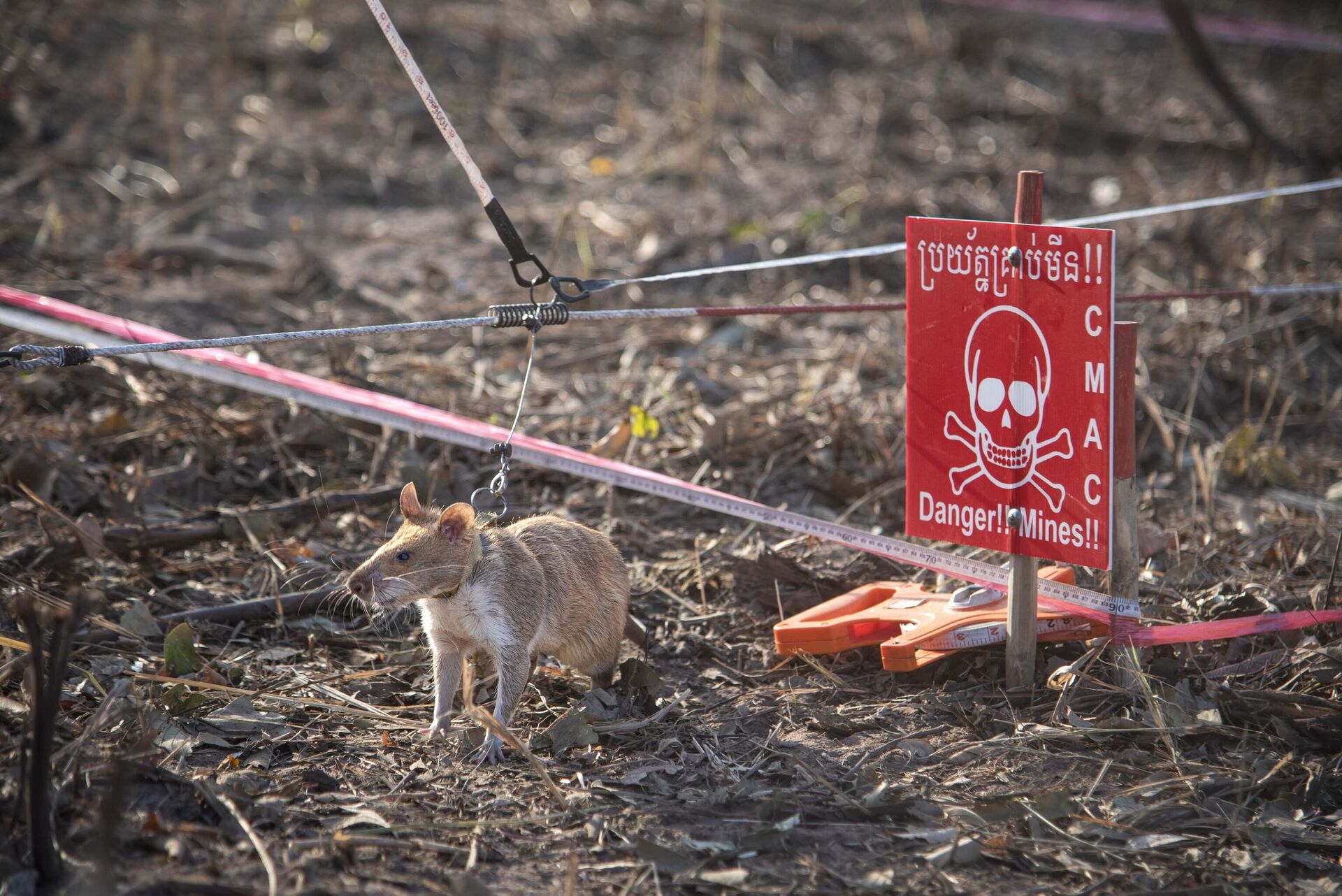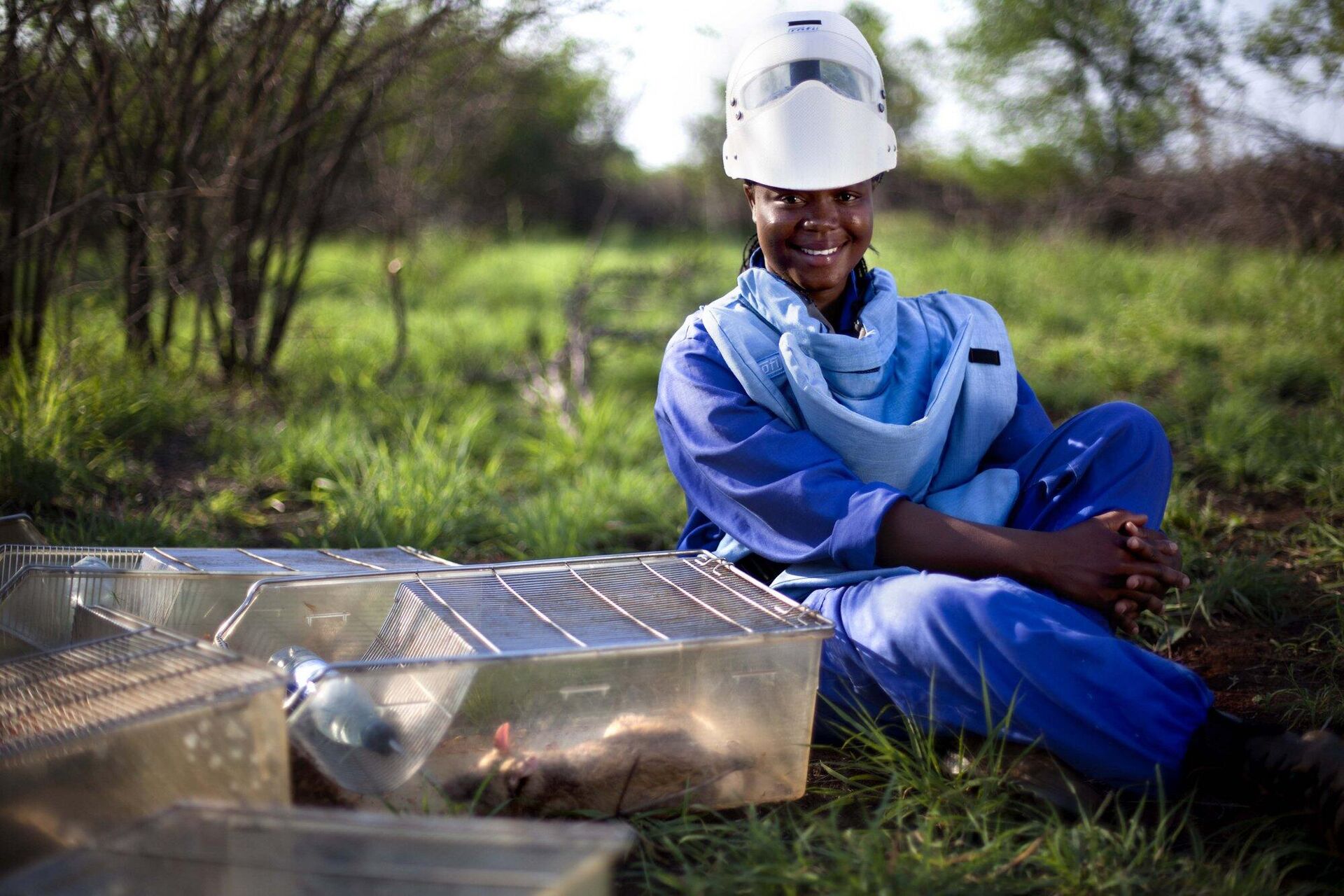https://en.sputniknews.africa/20231004/standing-guard-over-human-realm-african-hero-rats-detect-mines-save-lives-1062531301.html
Africa's Rescue Rats: Detecting Mines & Saving Lives
Africa's Rescue Rats: Detecting Mines & Saving Lives
Sputnik Africa
There is a saying that a sapper makes two mistakes: choosing the profession and stepping on a mine. What if there are sappers who are physically unable to... 04.10.2023, Sputnik Africa
2023-10-04T18:27+0200
2023-10-04T18:27+0200
2023-10-10T12:24+0200
east africa
tanzania
animals
belgium
health
healthcare
security
mozambique
sub-saharan africa
africa insight
https://cdn1.img.sputniknews.africa/img/07e7/0a/04/1062546185_0:0:3072:1728_1920x0_80_0_0_9abb0dc8673adfabb1eae3ccdf56c488.jpg
Founded by two Belgians, the Tanzania-based social enterprise APOPO (short for Anti-Personnel Landmines Removal Product Development) uses African giant pouched rats, which have a highly developed sense of smell, to detect landmines and tuberculosis. These rats are specially trained and referred to as HeroRATS.There are many practical applications for African giant pouched rats in various aspects of life, including demining, healthcare, and rescue operations, while their full potential has yet to be explored, said Lily Shallom, Communications Manager at APOPO, Tanzania, in an interview with Sputnik Africa. 'Why Not Rats?'APOPO originated as a Belgium-based research organization during the 1990s, receiving research and government grants to advance the development of rat mine detection technology. Bart Weertjens, a co-founder, stumbled upon an article about gerbils being used to detect explosives. This inspired an idea that rats, due to their sense of smell and ability to learn, could be the most effective choice for detecting landmines.Weertjens presented the idea to his best friend, Christophe Cox, who is now the CEO of the company, and his university professor. This is how it all began.The APOPO project was officially launched in November 1997, with initial financial support coming from the Belgian government. In 2000, APOPO moved its headquarters to the Sokoine University of Agriculture (SUA) in Morogoro, Tanzania, in partnership with the Tanzanian People's Defense Forces.According to Shallom, the African giant pouched rat is highly intelligent and easy to train. They are sociable and easy to care for, with a high level of resistance to tropical diseases. The most significant aspect of these rats is their light weight, which makes it safe for them to detect explosives on minefields without any detonation risks.How Does Clicker Training Work?Shallom briefly outlined the major training phases that rats undergo to become professionals in their field. At 4-5 weeks old, rat pups begin to open their eyes, marking the initiation of the first stage of training – socialization. Primarily, this stage involves playing with the pups to ensure their comfort around humans. At this point, it becomes crucial for the pups to acclimate themselves to humans, including familiarizing themselves with their sounds and smells.The next phase of training commences around the ten-week mark, coinciding with the separation from their mothers. They are moved into their designated home cages, and clicker training begins.In the initial phase of clicker training, a small soil table, approximately one meter by one meter in size, is used. The table is filled with soil and baby rats are free to explore it. When the rats are engaged in exploring, a click is made, followed by feeding. This process is repeated until they understand the correlation between the sound of the clicker and the food reward.Then the specialists introduce a tea infuser, commonly known as a "tea egg," with TNT inside. Shallom noted that the rats, being naturally inquisitive creatures, usually approach and explore it. When they touch the tea egg, a clicking sound is produced, and they are rewarded with food. Soon enough, they begin searching for "that smell, quite focused on that smell, because it means food and that's one of their main motivations."According to Shallom, they gradually expand the search area to make it more realistic. If the rats discover a tea egg that has TNT inside, they will hear a click and they can come and get their reward. She elaborated that the rats are rewarded with a syringe, which contains a "mixture of banana and avocado mixed in with some crushed rodent pellets and they love it."The next stage involves training on an actual minefield, marking the first time they are looking for real landmines. The rats are trained at a 24-hectare field provided by the organization's partner the Sokoine University of Agriculture, while the Tanzanian People's Defense Forces loaned 1500 landmines, she continued.Shallom emphasized that using rats for demining has a key advantage: they ignore all scrap metal, unlike metal detectors, and focus solely on the smell of explosives. Therefore, she stressed, rats are more efficient and 100% accurate. The organization has never missed a mine using rats in their operations for the past 25 years.APOPO operated in various African countries and beyond. One notable accomplishment mentioned by Shallom is their work in Mozambique, where they operated until the country was declared mine-free in 2015. Although numerous organizations were involved in the demining process, APOPO was the sole entity employing rats, which is a source of pride for the group, she said. Shallom also mentioned other countries where they work such as Angola, Cambodia, and Zimbabwe.Other Fields for Rats to Show Off Their TalentsShallom underlined that mine searching is not the only field, where the animals and their great sense of smell can be useful. Another sphere is healthcare. In particular, the African giant pouched rat is used to detect tuberculosis, which ranks as the second most fatal infectious disease globally. She noted that Tanzania, Mozambique and Ethiopia, where the organization has already established programs, bear the burden of tuberculosis. APOPO has a special training center where the rats are trained for tuberculosis detection.She further elaborated that in most of sub-Saharan Africa, clinics utilize microscopy to diagnose tuberculosis. However, this method has limitations as it is only 20 to 60% accurate. Consequently, in places like Tanzania, there is a significant possibility that the clinic may not diagnose TB accurately. So through the use of rats, APOPO's partner clinics are now detecting an additional 40% of cases that previously went undiagnosed, which is a significant achievement, she stressed. There are several other projects for which the organization is considering using the rats. One of them is using the animals in search and rescue missions.Another project involves wildlife detection. She said that several years ago, the Endangered Wildlife Trust of South Africa approached APOPO and asked, "Can your rats detect pangolins?" And according to Shallom, the answer is yes, they can. Furthermore, the rats can detect pangolin scales when they are "hidden among edible items."Pangolins are primarily trafficked for their scales, which are thought to have medicinal properties in traditional Chinese medicine, as well as for luxury food in China and Vietnam. In Africa, pangolins are sold as bushmeat, for ritual or spiritual purposes, and for use in traditional medicine. Thus, APOPO's rats could help prevent illegal trafficking of rare animals.Rats' Daily Routine Like humans, African giant pouched rats do not work on public holidays or weekends. They typically work Monday to Friday. However, due to their nocturnal nature and intolerance for heat, training occurs in the early morning or shaded, cool areas to optimize effectiveness.The workers conduct weekly check-ups with a veterinarian who ensures each animal is "thriving" and developing appropriately, she noted. The rats' growth is monitored every morning to ensure they are not gaining excessive weight and are staying within healthy ranges, similar to monitoring the growth of a baby.According to Shallom, rats typically retire at the age of 5 to 7 years. Retired rats receive the same level of care, a balanced diet, healthcare, and veterinary checks as their younger counterparts, but without undergoing any further training.Hero Rat Magawa One of the most famous rats APOPO trained to detect explosives was Magawa. Shallom recalled that he was born in Tanzania and underwent rigorous training, displaying exceptional determination and speed. He graduated as the top performer and was subsequently deployed to Cambodia, where he dedicated his entire career. Magawa retired at around seven years of age and later passed away when he was eight years old. Even among his experienced colleagues working in Cambodia, Magawa is exceptional. In five years, he cleared over 23 hectares of land from 71 mines and 38 unexploded bombs. During his distinguished five-year career, Magawa probably saved the lives of hundreds of people from hidden landmines and other deadly remnants of war.In September 2020, Magawa was awarded one of the UK's highest animal awards. In a virtual ceremony, UK charity PDSA presented Magawa with a gold medal "to honor him for his great work," for the lives he had saved and the land he had helped clear so that local communities could rebuild their lives.
east africa
tanzania
belgium
mozambique
Sputnik Africa
feedback@sputniknews.com
+74956456601
MIA „Rossiya Segodnya“
2023
News
en_EN
Sputnik Africa
feedback@sputniknews.com
+74956456601
MIA „Rossiya Segodnya“
Sputnik Africa
feedback@sputniknews.com
+74956456601
MIA „Rossiya Segodnya“
east africa, tanzania, animals, belgium, health, healthcare, security, mozambique, africa insight
east africa, tanzania, animals, belgium, health, healthcare, security, mozambique, africa insight
Founded by two Belgians, the Tanzania-based social enterprise APOPO (short for Anti-Personnel Landmines Removal Product Development) uses African giant pouched rats, which have a highly developed sense of smell, to detect landmines and tuberculosis. These rats are specially trained and referred to as HeroRATS.
There are many practical applications for African giant pouched rats in various aspects of life, including demining, healthcare, and rescue operations, while their full potential has yet to be explored, said Lily Shallom, Communications Manager at APOPO, Tanzania, in an interview with Sputnik Africa.
"To be honest, the opportunities are endless because the rats are really, really smart. They have an amazing sense of smell. We're confident that we can train them to smell anything that has a distinct smell. It just all comes down to funding and a need for them in the real world scenario," she said.
APOPO originated as a Belgium-based research organization during the 1990s, receiving research and government grants to advance the development of rat mine detection technology. Bart Weertjens, a co-founder, stumbled upon an article about gerbils being used to detect explosives. This inspired an idea that rats, due to their sense of smell and ability to learn, could be the most effective choice for detecting landmines.
"He was looking specifically at the landmine problem in sub-Saharan Africa. Now, he used to keep pet rats as a kid [...]. So when he read this, he thought immediately back to his sort of childhood friends and thought, why not rats?" Shallom recalled.
Weertjens presented the idea to his best friend, Christophe Cox, who is now the CEO of the company, and his university professor. This is how it all began.
The APOPO project was officially launched in November 1997, with initial financial support coming from the Belgian government. In 2000, APOPO moved its headquarters to the Sokoine University of Agriculture (SUA) in Morogoro,
Tanzania, in partnership with the Tanzanian People's Defense Forces.
According to Shallom, the African giant pouched rat is highly intelligent and easy to train. They are sociable and easy to care for, with a high level of resistance to tropical diseases. The most significant aspect of these rats is their light weight, which makes it safe for them to detect explosives on minefields without any detonation risks.
"Most importantly, they're too light to set off the landmines. So it's perfectly safe for them to be on the minefields using their noses to detect explosives," she noted.
How Does Clicker Training Work?
Shallom briefly outlined the major training phases that rats undergo to become professionals in their field.
At 4-5 weeks old, rat pups begin to open their eyes, marking the initiation of the first stage of training – socialization. Primarily, this stage involves playing with the pups to ensure their comfort around humans. At this point, it becomes crucial for the pups to acclimate themselves to humans, including familiarizing themselves with their sounds and smells.
The next phase of training commences around the ten-week mark, coinciding with the separation from their mothers. They are moved into their designated home cages, and clicker training begins.
"So we use clicker training to train all of our rats [...]. We use positive reinforcement. So we're teaching the baby rats to look for a target smell. In this case, it's TNT [Trinitrotoluene, a chemical compound best known as an explosive material]. And we reward them for doing the correct action when they find it," Shallom explained.
In the initial phase of clicker training, a small soil table, approximately one meter by one meter in size, is used. The table is filled with soil and baby rats are free to explore it. When the rats are engaged in exploring, a click is made, followed by feeding. This process is repeated until they understand the correlation between the sound of the clicker and the food reward.
Then the specialists introduce a tea infuser, commonly known as a "tea egg," with TNT inside. Shallom noted that the rats, being naturally inquisitive creatures, usually approach and explore it. When they touch the tea egg, a clicking sound is produced, and they are rewarded with food. Soon enough, they begin searching for "that smell, quite focused on that smell, because it means food and that's one of their main motivations."
"So then we expand to a larger table. They also start to wear a harness because on a real mine field they will be attached to a line between two handlers on either side of a box," she said, adding: "We start to bury them [the tea eggs] under the surface. So they kind of are digging them up because they're actually a lot like puppies. If they could, they would pick them up and take them to their handlers, but once they're scratching at that tag that contains TNT, they hear a click and they get a reward. And this is teaching them how to indicate to us that they've found something."
According to Shallom, they gradually expand the search area to make it more realistic. If the rats discover a tea egg that has TNT inside, they will hear a click and they can come and get their reward. She elaborated that the rats are rewarded with a syringe, which contains a "mixture of banana and avocado mixed in with some crushed rodent pellets and they love it."
The next stage involves
training on an actual minefield, marking the first time they are looking for real landmines. The rats are trained at a 24-hectare field provided by the organization's partner the Sokoine University of Agriculture, while the Tanzanian People's Defense Forces loaned 1500 landmines, she continued.
"I guess the main advantage of using the HeroRATs, as we call them, is that they're speeding up in finding the landmines. So they can search an area the size of a tennis court and cover all of that in about 30 minutes," she noted, adding: "It would take a deminer with a metal detector up to four days, depending on how much scrap metal is lying around that will set off the metal detector and they will have to investigate."
Shallom emphasized that using rats for demining has a key advantage: they ignore all scrap metal, unlike metal detectors, and focus solely on the smell of explosives. Therefore, she stressed, rats are more efficient and 100% accurate. The organization has never missed a mine using rats in their operations for the past 25 years.
APOPO operated in various African countries and beyond. One notable accomplishment mentioned by Shallom is their work in Mozambique, where they operated until the country was declared mine-free in 2015. Although numerous organizations were involved in the demining process, APOPO was the sole entity employing rats, which is a source of pride for the group, she said. Shallom also mentioned other countries where they work such as Angola, Cambodia, and Zimbabwe.
Other Fields for Rats to Show Off Their Talents
Shallom underlined that mine searching is not the only field, where the animals and their great sense of smell can be useful. Another sphere is healthcare. In particular, the African giant pouched rat is used to detect tuberculosis, which ranks as the second most fatal infectious disease globally.
She noted that Tanzania, Mozambique and
Ethiopia, where the organization has already established programs, bear the burden of tuberculosis. APOPO has a special training center where the rats are trained for tuberculosis detection.
"The training process is very similar to the landmine detection, except that now when the rats are learning their target scent they would then be introduced to the smell of tuberculosis," she explained.
She further elaborated that in most of sub-Saharan Africa, clinics utilize microscopy to diagnose tuberculosis. However, this method has limitations as it is only 20 to 60% accurate. Consequently, in places like Tanzania, there is a significant possibility that the clinic may not diagnose TB accurately. So through the use of rats, APOPO's partner clinics are now detecting an additional 40% of cases that previously went undiagnosed, which is a significant achievement, she stressed.
There are several other projects for which the organization is considering using the rats. One of them is using the animals in search and rescue missions.
"Those first 24 hours are really, really critical. We came together and started looking at how we could get the rats into a building to look for survivors. And that's what we're training a group of rats here in Tanzania for. So they're learning to locate a human amongst a lot of rubble," Shallom said.
Another project involves wildlife detection. She said that several years ago, the Endangered Wildlife Trust of South Africa approached APOPO and asked, "Can your rats detect pangolins?" And according to Shallom, the answer is yes, they can. Furthermore, the rats can detect pangolin scales when they are "hidden among edible items."
Pangolins are primarily trafficked for their scales, which are thought to have medicinal properties in traditional Chinese medicine, as well as for luxury food in China and Vietnam. In Africa, pangolins are sold as bushmeat, for ritual or spiritual purposes, and for use in traditional medicine. Thus, APOPO's rats could help prevent illegal trafficking of rare animals.
Like humans, African giant pouched rats do not work on public holidays or weekends. They typically work Monday to Friday. However, due to their nocturnal nature and intolerance for heat, training occurs in the early morning or shaded, cool areas to optimize effectiveness.
"They also get scheduled time in our play cages, which are just large enclosures that contain different elements like a running wheel, hanging ropes, branches to climb, there's lots of dirt for them to dig in, if that's something that they're interested in. They would have things to climb on, leaves to rummage in and different surfaces that they can walk on, just stuff for them," Shallom said.
The workers conduct weekly check-ups with a veterinarian who ensures each animal is "thriving" and developing appropriately, she noted. The rats' growth is monitored every morning to ensure they are not gaining excessive weight and are staying within healthy ranges, similar to monitoring the growth of a baby.
According to Shallom, rats typically retire at the age of 5 to 7 years. Retired rats receive the same level of care, a balanced diet, healthcare, and veterinary checks as their younger counterparts, but without undergoing any further training.
One of the most famous rats APOPO trained to detect explosives was Magawa. Shallom recalled that he was born in Tanzania and underwent rigorous training, displaying exceptional determination and speed. He graduated as the top performer and was subsequently deployed to Cambodia, where he dedicated his entire career.
Magawa retired at around seven years of age and later passed away when he was eight years old. Even among his experienced colleagues working in Cambodia, Magawa is exceptional. In five years, he cleared over 23 hectares of land from 71 mines and 38 unexploded bombs. During his distinguished five-year career, Magawa probably saved the lives of hundreds of people from hidden landmines and other deadly remnants of war.
In September 2020, Magawa was awarded one of the UK's highest animal awards. In a virtual ceremony, UK charity PDSA presented Magawa with a gold medal "to honor him for his great work," for the lives he had saved and the land he had helped clear so that local communities could rebuild their lives.
"And he also won a Guinness World record, I believe, for the most landmines found during the career of a HeroRAT," she said, adding: "He's definitely our biggest ambassador to date. It's sad that he's no longer with us, but he was a good rat."
